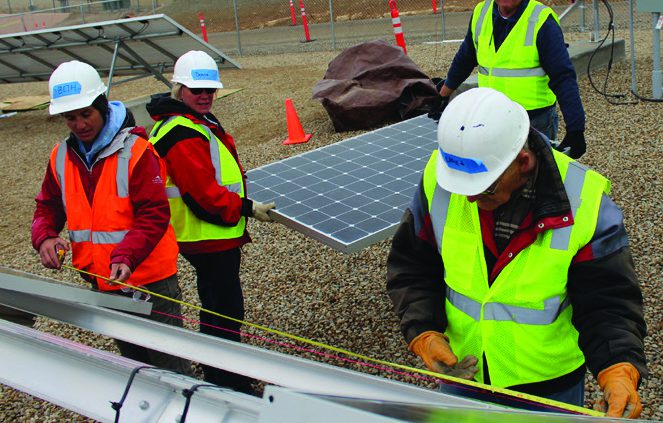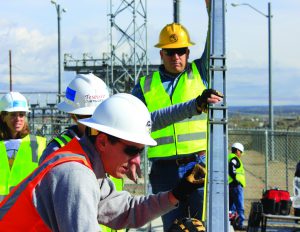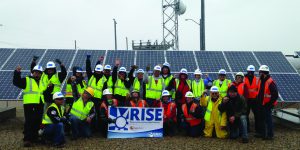Group Effort Generates New Solar Garden in Southwest Colorado
A collaborative effort between three renewable energy supporters made Empire Electric Association’s Solar Assist Cooperative Garden a reality. The story of the partnership between the Cortez-based electric co-op and GRID Alternatives, a nonprofit from California, started when GRID reached out to EEA through the Colorado Energy Office.
By February 2016 the agreement was in place between EEA and GRID and construction began. The arrays were completed in April, thus making EEA the first system in the state of Colorado to partner with the Colorado Energy Office and GRID.
GRID received $1.2 million in grant money from the Colorado Energy Office to partner with Colorado co-ops and bring community solar to low-income families. GRID made a proposal to EEA for the installation of the 70 solar photovoltaic panels that produces 21.35 kilowatts in these arrays. In addition, GRID promised to be on site to train and lead teams of community volunteers and job trainees installing the solar structure. Through this program, five to 10 qualifying EEA members will see a reduction on their electric bills depending on how much energy the arrays generate.
EEA General Manager Josh Dellinger said, “The board feels that projects like this that benefit our community are in the best interest of our members as a whole. EEA has a long history of donating to organizations with various needs in our community and is glad to support our members.”
The volunteer solar installers included three Empire Electric employees, including Dellinger, as well as Montezuma-Cortez High School senior students, potential solar subscribers, student trainees from the Navajo Technical University in New Mexico and residents from Cortez.
The preparation for the expansion was completed and ready for the volunteers to finish the project in two days. Upon arrival, the volunteers were issued a hard hat, safety glasses, work gloves and a reflective vest. GRID divided the community volunteers into work teams headed by a GRID team leader. The volunteers got to work and eagerly helped assemble the arrays.
Dellinger volunteered on the first work day, helping install the framework for the solar panels to rest on. Dellinger said it was great to see potential subscribers contributing to the project. “It was also good to see volunteers from the high school participate,” he said. “It is nice when people come together on a project that will benefit members of our community.”
Day two included a dismal forecast of rain and snow. The job for the day was to secure and connect solar panels to the gleaming double tracks that were installed the previous day. Panel cables were attached to the inverters and the panels were secured using special fasteners. Once the cables were attached, a light flashed on the inverter, completing the connection.
EEA system engineer Clint Rapier volunteered at the project and was impressed by the preparation GRID Alternatives made: the preassembled tool kits, personal protective equipment, safety plan, briefing and organization. “It was apparent GRID had done this before and had refined the process,” Rapier said.
“Volunteering brings a sense of pride when working on projects for our community,” said EEA communications specialist Denise Moore, who also volunteered on the project. “Even though it was cold and we were soaking wet, everyone was there to get the job done. Working with such positive people made the job go quickly, and it was an inspiration to be involved in this uplifting community project.
The Solar Assist Cooperative Garden is located on EEA’s property in Cortez where it is maintained by the cooperative. Members can lease solar panels for a 20-year period and receive credit for the power generated by their panel.





